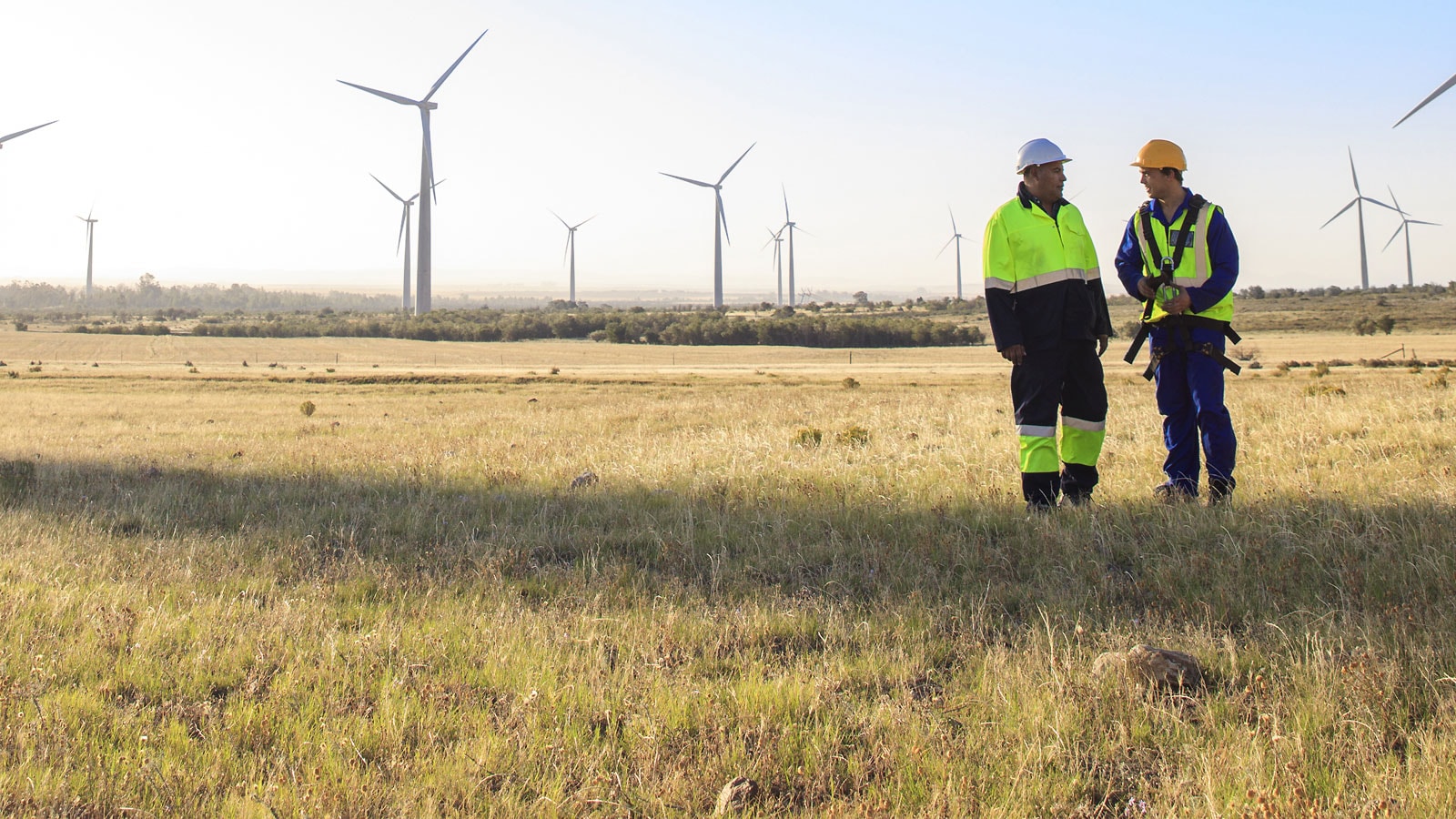Moving towards a low-carbon economy is both necessary and urgent as the impacts of climate change begin to be felt. Governments and businesses are under increasing pressure to act, and companies need clear strategies to show how they are addressing these challenges while staying competitive in evolving markets.
What is a climate-transition strategy?
A climate-transition strategy is a structured plan that outlines how an organisation aligns its activities with the goals of a net-zero economy, based on the latest climate science. It covers key areas such as governance, targets, actions and resources required to achieve the transition.
The strategy involves assessing the organisation’s carbon footprint, setting emissions reduction targets, and defining practical actions of how these goals can be achieved. This would include engaging with key stakeholders, adjusting governance structures, and assessing funding options to support necessary investments.
The aim is to integrate sustainability into the core business model, reduce risks, ensure regulatory compliance, and position the company to thrive in a low-carbon economy.

What are climate solutions?
Climate solutions are innovations and practices that support the transition to a low-carbon economy. These typically include transitioning to renewable energy sources, investment in innovation and technology, switching to more energy-efficient solutions and partnering with other players along the value chain with the aim to reduce emissions and address climate challenges.
Effective solutions are those that are scalable, financially viable, and impactful, addressing both mitigation (reducing emissions) and adaptation (helping societies cope with climate impacts).

Why develop a climate-transition strategy?
Developing a climate-transition strategy is both a responsible decision and a growing strategic necessity in today’s business environment. As organisations improve their response to sustainability pressures, there are various reasons why they should begin to prioritise this:
- Securing access to finance
- Strengthening credibility with stakeholders
- Accelerating decarbonisation
- Meeting regulatory and disclosure requirements
Securing access to finance
Investors and banks increasingly consider environmental commitments, risks and performance when allocating capital. A clear climate-transition strategy demonstrates a proactive approach to addressing climate challenges, ensuring financial viability and attracting investment.
Strengthening credibility with stakeholders
Consumers, suppliers and employees are holding organisations accountable for their environmental impacts. A well-defined climate-transition strategy signals genuine commitment to climate action, building trust and engagement.
Accelerating decarbonisation
Decarbonisation requires collaboration across departments and alignment at every level of the organisation. A climate-transition strategy translates climate goals into actionable steps, fostering internal coordination and driving momentum to achieve meaningful emissions reductions.
Meeting regulatory and disclosure requirements
Regulations like the EU’s Corporate Sustainability Reporting Directive (CSRD), Corporate Sustainability Due Diligence Directive (CSDDD), and the SEC’s climate disclosure rules, amongst others, highlight the need for a robust climate-transition strategy. Ultimately, having a clear plan prepares organisations to comply with current and future requirements.
Overcoming challenges in climate-transition strategy
For leaders developing a climate-transition strategy, understanding the main possible challenges is essential. Broadly, these include behaviours, time, emotions, interdependencies, and focus, which affect both the demand for and the supply of climate solutions. Learning from the experiences of others can help navigate these obstacles effectively.

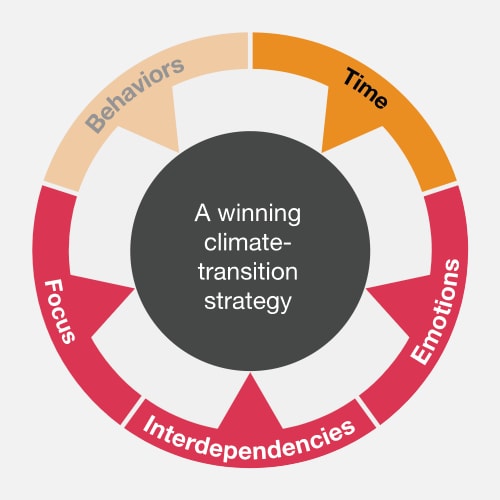
Behaviours
Business leaders often assume that offering climate solutions at competitive prices will naturally attract customers. In reality, customer adoption depends on how well solutions align with their preferences and habits.
Key questions to ask:
What customer behaviours and needs must we address?
Do our climate solutions meet customer expectations for affordability and convenience?
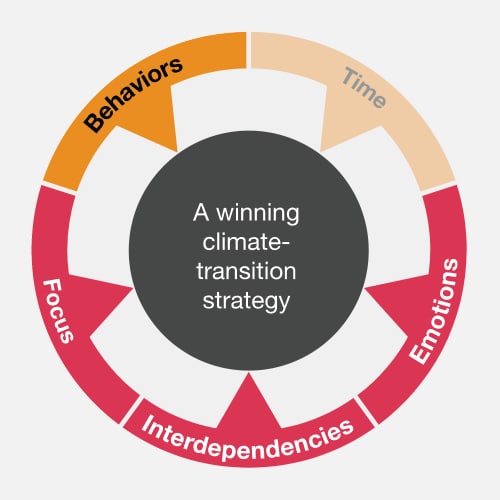
Time
The transition to a low-carbon economy will unfold over decades, requiring companies to adapt to evolving demand and reconfigure supply chains. A forward-looking strategy, or beginning the conversation to have one, is critical to stay ahead.
Key questions to ask:
Which trends and developments should we track to anticipate changes in demand?
How effectively do we adapt our expectations as new information becomes available?
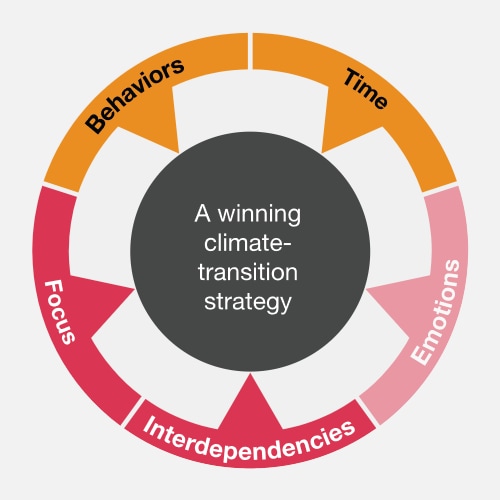
Emotions
Climate change elicits strong emotions, which can influence decisions. Leaders must ensure their strategies are guided by data rather than emotional reactions to avoid bias in decision-making.
Key questions to ask:
- How effectively do we use data on technology, markets, and policies to inform decisions?
Are employees equipped to understand and align with the data supporting our strategy?
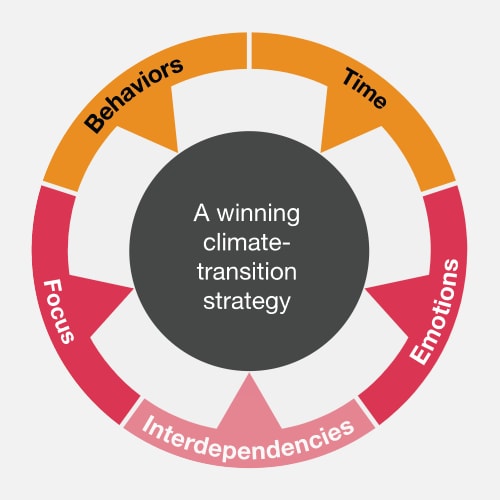
Interdependencies
The success of a company’s climate solutions often depends on external factors, including the actions of suppliers, partners, and policymakers. Understanding and managing these interdependencies is crucial.
Key questions to ask:
- How much control do we have over the resources required to deliver our solutions?
- How strong are our partnerships with those who provide critical inputs, such as materials or financing?
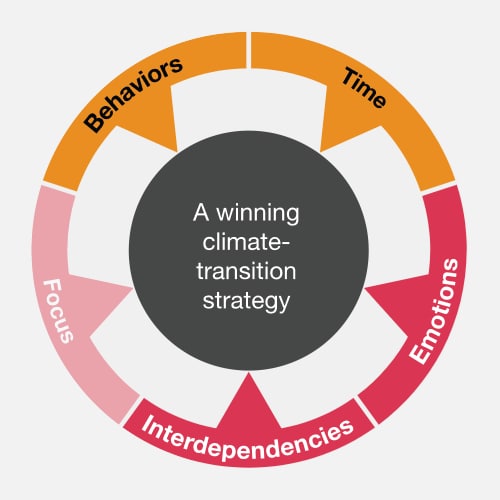
Focus
Balancing attention between legacy businesses and new climate initiatives is vital. Focusing too heavily on new opportunities risks neglecting the core business, which is often necessary to fund climate investments.
Key questions to ask:
- Are we ensuring profitability in both our core operations and new climate initiatives?
- How disciplined are we in pursuing opportunities where we can provide unique value?
How can we help?
Beyond supporting your existing or planned sustainability initiatives, our teams can assist your organisation in meeting CSRD reporting and its strategic requirements. We can help ensure compliance while making certain that your reported data and KPIs are accurate, balanced, and aligned with your overall business objectives. Additionally, we can support you with defining your sustainability goals and integrating these into your strategic decision-making process, leveraging data systems to monitor and optimise performance. Should you wish to explore these opportunities and develop a comprehensive approach to CSRD, please reach out to our dedicated teams.
Contact us











